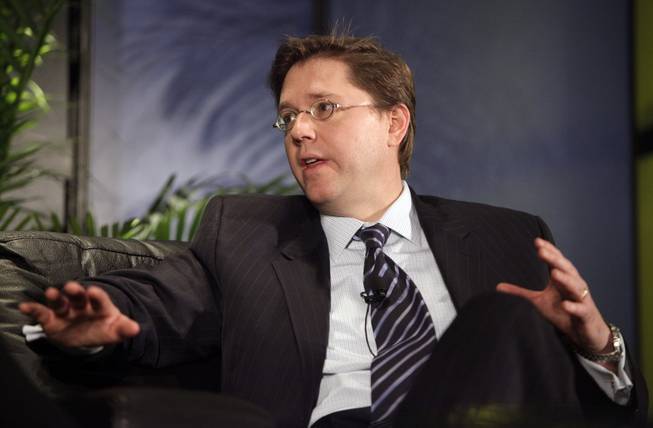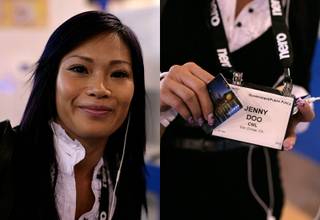
Jae C. Hong / Associated Press
Federal Communications Commission Chairman Kevin Martin talks to Gary Shapiro, president and chief executive officer of the Consumer Electronics Association, not pictured, during a discussion Saturday at the Las Vegas Convention Center as part of the Consumer Electronics Show.
Saturday, Jan. 10, 2009 | 4:49 p.m.
Expanded coverage
Sun archives
Beyond the Sun
President-elect Barack Obama’s transition team last week asked Congress to delay the heavily promoted Feb. 17 transition from analog to digital broadcasting to later date – a suggestion that doesn’t sit well with Federal Communications Commission Chairman Kevin Martin.
In a discussion today at the Las Vegas Convention Center as part of the Consumer Electronics Show, Martin said although there are glitches in the government’s coupon program for digital converter boxes – the leading reason Obama’s team said a delay was necessary – the problems aren’t insurmountable and shouldn’t stunt the planned transition.
“What kind of a message will that send if we’ve been telling everybody that this is the date it’s going to happen (and then it doesn’t)?” he said. “If there’s an alternative to moving the date, then we should try and make sure that that happens.”
At this point, he said, the government has an obligation to do everything it can to make the transition as scheduled because not doing so could prove chaotic. Many broadcasters are in the midst of getting rid of their analog equipment entirely, he said. Postponing the date could put a pinch in construction plans that are already underway at stations across the country.
Not to mention the potential to confuse and frustrate consumers.
"I'm concerned about a delay in the sense that if you can solve that issue other ways, a delay has actually the potential to confuse consumers," Martin said. "All of our messaging has been about Feb. 17 — not just ours — the industry's."
The Feb. 17 date has been widely advertised by television stations across the country.
He called on Congress to put additional resources into the government’s program, which forces the $40 coupon toward converter boxes to expire after 90 days after they're issued.
2009 marks the third and likely final time for Martin to host a session at CES. Martin, who was appointed to chair the FCC by President Bush in 2005, will almost certainly be replaced by a Democrat after Obama takes over the White House.
During Saturday’s talk, which was moderated by Consumer Electronics Association president and chief executive officer Gary Shapiro, Martin touched on his tenure with the FCC and offered some advice to the incoming administration.
“You’ve got to be willing to make the hard calls and that’s difficult,” he said. “No one ever remembers when you agree with them, but no one ever forgets when you disagree with them. And that’s one of the biggest challenges.”
Martin also touched on the XM-Sirius satellite radio merger, saying that one of the driving reasons the commission approved it was because both companies had been hurting financially.
“In the end, I think we made the right decision – but I think it was worth the extra consideration,” he said.
Other topics broached in the hour-long session included Martin’s thoughts on the V-Chip (he says the TV ratings system needs improvement), broadband Internet regulation (he’s against it), how much cable television costs (too much, he says, because of too little competition) and indecency regulations.
The only instances in which content should be regulated are when it can affect children, he said, adding that content on the Internet needs no government regulation because children need to be old enough to read and use a computer to access it.
“Content that’s pushed out (like television and radio) is very different than content that you select to pull in, and that’s one of the big distinctions,” he said.
He said moving forward, the FCC needs to focus more on encouraging platform-independence of media. In the next five to 10 years, especially as wireless broadband becomes more prevalent, content, via the Internet, should be accessible on devices that range from computers and televisions to cell phones and other handheld devices.
While the broadband pipes generally shouldn’t be regulated, he said, cable television might need some help from the government to become more affordable because of lack of competition. For the past several years, rates consumers pay for cable television have been rising faster than inflation, he said.
With the advent of wireless broadband, FIOS, satellite Internet and the expansion of broadband in general, there is enough market competition that the broadband market will regulate itself and government should, for the most part, keep its hands out of it, he said.
“Ushering in the wireless broadband world is certainly one of the most exciting things, and one of the things I’m most proud of,” he said.



Join the Discussion:
Check this out for a full explanation of our conversion to the LiveFyre commenting system and instructions on how to sign up for an account.
Full comments policy